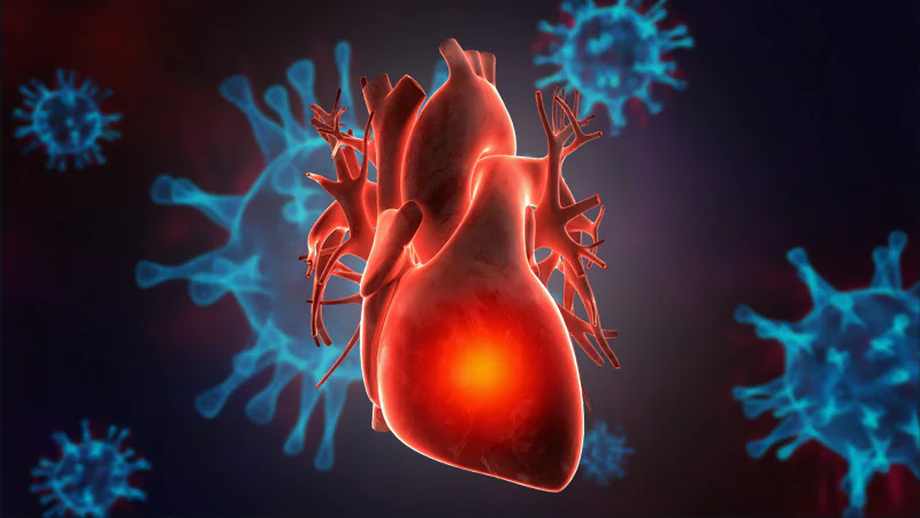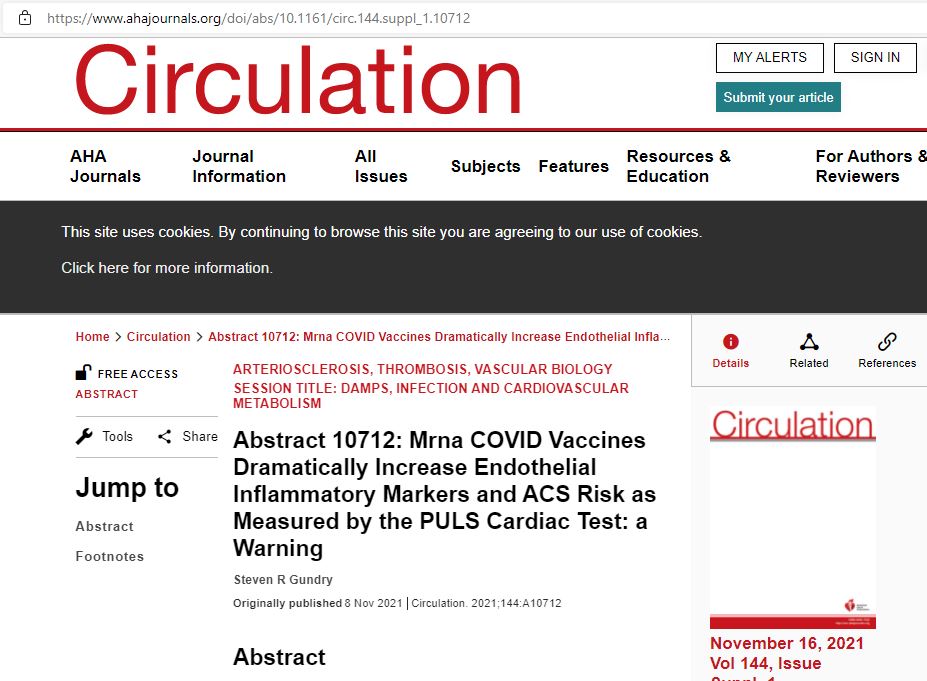American Heart Association (AHA) is now warning that mRNA vaccines ‘dramatically increase the inflammation on the endothelium (inner heart membrane)’ after a new study of 566 patients found that risks of severe problems increased to 1 in 4, compared to 1 in 9 before

In September, a study from the University of California found that teenage boys are more at risk from vaccines than covid. The study also found that youths are 6 times more likely to suffer from heart problems from the vaccine than being hospitalized from Covid.
Just two months later, a new study from the American Heart Association (AHA) is now warning about the mRNA vaccines “dramatically increase inflammation on the endothelium,” a thin membrane that lines the inside of the heart and blood vessels.
In a study titled, “Abstract 10712: Mrna COVID Vaccines Dramatically Increase Endothelial Inflammatory Markers and ACS Risk as Measured by the PULS Cardiac Test: a Warning,” researchers said that the risk of developing acute coronary syndrome (ACS) significantly increased in 566 patients after receiving Pfizer and or Moderna mRNA COVID-19 vaccines.
Dr. Steven Grundy, a Nebraska physician and retired cardiac surgeon, presented the findings at the 2021 Scientific Sessions of the American Heart Association’s annual conference held in Boston from November 13 to 15, 2021. An abstract is available in Circulation, the AHA’s scientific journal.
The study included 566 men and women (1:1) aged 28-97 years, who were patients in a preventive cardiology practice. All patients received a new PULS Cardiac Test 2-10 weeks after their second COVID-19 vaccine. The researchers found that the risk of heart attacks or other severe coronary problems more than doubled months after the vaccines were administered, based on changes in markers of inflammation and other cell damage. The study also found that patients had a 1 in 4 risk for severe problems after the vaccines, compared to 1 in 9 before.
This test result was compared with a PULS score from 3-5 months pre-vaccination. The PULS Cardiac Test measures multiple protein biomarkers, including hepatocyte growth factor [HGF], soluble Fas, and IL-16, and uses the results to calculate a 5-year risk score for new ACS. The PULS score increases with above-normal elevation. All participants received this test every 3-6 months for 8 years.
At the end of the study, Dr. Gundryr concluded that “mRNA [vaccines] dramatically increase inflammation on the endothelium and T cell infiltration of cardiac muscle and may account for the observations of increased thrombosis, cardiomyopathy, and other vascular events following vaccination.” Below is the key takeaway from the study.
“We conclude that the mRNA vacs dramatically increase inflammation on the endothelium and T cell infiltration of cardiac muscle and may account for the observations of increased thrombosis, cardiomyopathy, and other vascular events following vaccination.”
The study might explain why cardiologists around the world are seeing cases of people with heart-related problems following the covid shots.

Abstract
Our group has been using the PLUS Cardiac Test (GD Biosciences, Inc, Irvine, CA) a clinically validated measurement of multiple protein biomarkers which generates a score predicting the 5 yr risk (percentage chance) of a new Acute Coronary Syndrome (ACS).
The score is based on changes from the norm of multiple protein biomarkers including IL-16, a proinflammatory cytokine, soluble Fas, an inducer of apoptosis, and Hepatocyte Growth Factor (HGF)which serves as a marker for chemotaxis of T-cells into epithelium and cardiac tissue, among other markers. Elevation above the norm increases the PULS score, while decreases below the norm lowers the PULS score.The score has been measured every 3-6 months in our patient population for 8 years.
Recently, with the advent of the mRNA COVID 19 vaccines (vac) by Moderna and Pfizer, dramatic changes in the PULS score became apparent in most patients.This report summarizes those results. A total of 566 pts, aged 28 to 97, M:F ratio 1:1 seen in a preventive cardiology practice had a new PULS test drawn from 2 to 10 weeks following the 2nd COVID shot and was compared to the previous PULS score drawn 3 to 5 months previously pre- shot.
Baseline IL-16 increased from 35=/-20 above the norm to 82 =/- 75 above the norm post-vac; sFas increased from 22+/- 15 above the norm to 46=/-24 above the norm post-vac; HGF increased from 42+/-12 above the norm to 86+/-31 above the norm post-vac. These changes resulted in an increase of the PULS score from 11% 5 yr ACS risk to 25% 5 yr ACS risk.
At the time of this report, these changes persist for at least 2.5 months post second dose of vac.We conclude that the mRNA vacs dramatically increase inflammation on the endothelium and T cell infiltration of cardiac muscle and may account for the observations of increased thrombosis, cardiomyopathy, and other vascular events following vaccination.




